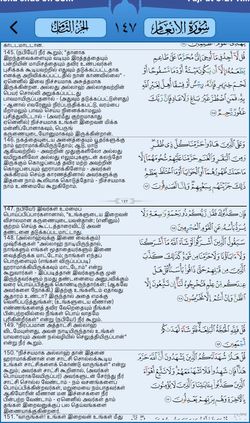Nov 10, 2024
Surah Al An'am (Verses 145-150)
بِسْمِ ٱللَّٰهِ ٱلرَّحْمَٰنِ ٱلرَّحِيمِ,
(bi-smi llāhi r-raḥmāni r-raḥīm)
"In the name of Allah, the Most Gracious, the Most Merciful"
"Assalamualaikum/Hello and welcome! It's a pleasure to have you join us on this platform. Feel free to explore and engage with our community."
Feel free to join the cafe and our Instagram page for notifications and updates;
Hilokal;
https://hilokal.page.link/eUxfM
Instagram;
https://instagram.com/ideologyovlife?igshid=NjIwNzIyMDk2Mg==
Chapter 6, Verses 145-150
Surah Al-An'am, Verses 145-150
Recitation.
Translation.
Tafseer.
LESSON # 18 Chapter # 6 (Surah Al An'am)
For English Reference;
https://www.islamicstudies.info/tafheem.php?sura=6&verse=145&to=150
For Urdu Reference;
https://tafheem.net/islamikitabein/urduref.php?sura=6&verse=145-150
Translations;
Please follow the sequence to find your language;
English
Urdu
Hindi
Tamil
Bangali
Korean
Kurdish
Turkish
Portuguese
Spanish
LESSON # 18 of Chapter # 6.
Difficult Vocabularies from LESSON # 17 (Chapter # 6 Verses 145-150)
Verse # 145.
1- Carrion. (Noun)
(Dead or decaying flesh.)
2- Swine. (Noun)
(A person who you consider to be extremely unpleasant and unkind.)
3- Profane. (Adjective)
(Showing no respect for a god or a religion, often through language.)
4- Disapprobation. (Noun)
(Strong feelings of not approving of something or someone.)
Verse # 147.
5- Avert. (Verb)
(To prevent something bad from happening.)
Verse # 148.
6- Plead. (Verb)
(To make an urgent, emotional statement or request for something.)
7- Compulsion. (Noun)
(A very strong feeling of wanting to do something repeatedly that is difficult to control.)
Verse # 149.
8- Refutation. (Noun)
(The act of saying or proving that a person, statement, opinion, etc. is wrong or false.)
9- Plea. (Noun)
(An urgent and emotional request.)
10- Succinctly. (Adverb)
(In a way that expresses what needs to be said clearly and without unnecessary words.)
Verse # 150.
11- Prevalent. (Adjective)
(Existing very commonly or happening often.)
12- Brazen. (Adjective)
(Obvious, without any attempt to be hidden.)
13- Compunction. (Noun)
(A slight guilty feeling about something you have done or might do.)
14- Sanction. (Noun)
(An official order, such as the stopping of trade, that is taken against a country in order to make it obey international law.)











LESSON # 18 of Chapter # 6.
References from LESSON # 18 (Chapter # 6 Verses 145-150)
Verse # 145.
1- Qur'aan (2:173)
https://islamicstudies.info/reference.php?sura=2&verse=173
2- Qur'aan (5:3)
https://islamicstudies.info/reference.php?sura=5&verse=3
3- Qur'aan (16:115)
https://islamicstudies.info/reference.php?sura=16&verse=115
Verse # 146.
4- Qur'aan (3:93)
https://islamicstudies.info/reference.php?sura=3&verse=93
5- Qur'aan (4:160)
https://islamicstudies.info/reference.php?sura=4&verse=160
6- (See Leviticus ll: 4; Deuteronomy 14: 7)
7- (See Leviticus 3:17; 7:22-3; ll:16-18; Deuteronomy 14:14-16.)
LESSON # 18 of Chapter # 6.
Summary of Verses (141-144) of Chapter # 6 Surah Al An'am:
Surah Al-An’am (Chapter 6:145-150) address dietary prohibitions, arguments against idolatry, and emphasize Allah’s final judgment and wisdom in guiding humanity.
Here is the summary:
These verses clarify permissible and forbidden foods: carrion, blood, pork, and any animal sacrificed to other than Allah.
Allah explains that some dietary restrictions were imposed on Jews as a punishment, emphasizing that only He can set lawful and unlawful boundaries.
The idolaters argue that Allah’s will justifies their practices, but Allah refutes this, stressing His guidance is clear and cannot be based on conjecture.
Finally, Allah challenges them to provide evidence for their claims, reinforcing His ultimate authority and the futility of following baseless practices.
Thankyou everyone for joining.
May Allah rewards all of you for your precious time spent here & may Allah keeps pouring his blessings upon you and your loved ones.
Stay safe & and blessed.
Aslamualaikum to all of you.
By undefined
18 notes ・ 2 views
English
Proficient